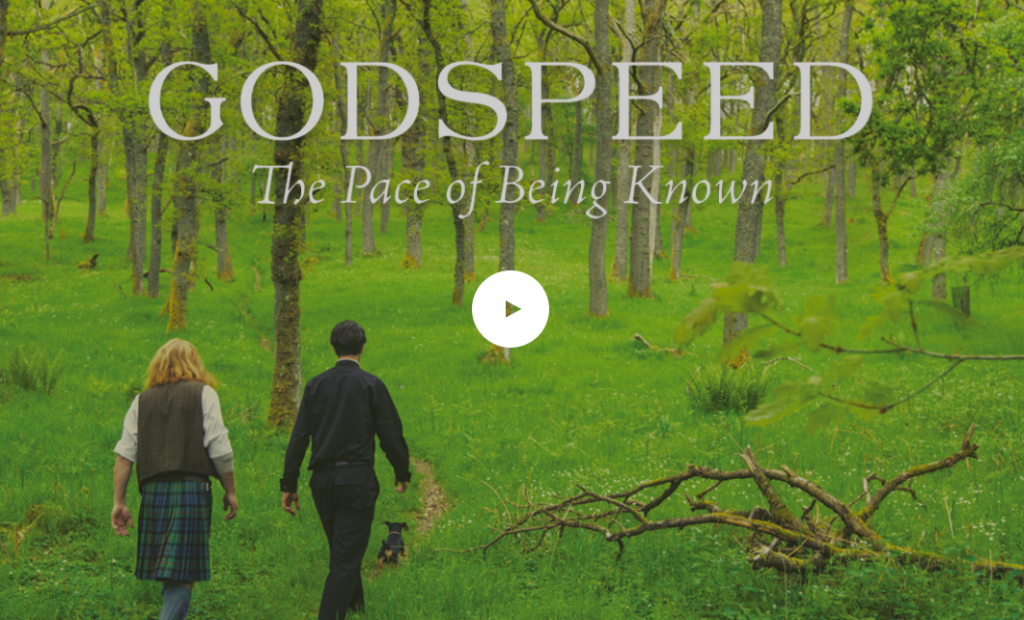We’ve been here on Aughrim Line for a month and a half now. In this relocation from the heart of the urban core to a farmhouse in the middle of nowhere, you might conclude that we’ve pulled away from community and from people. What I would suggest is that community looks different out here, and yet people who live in rural environments know a lot about neighbouring.
So far in our short time here, we’ve had neighbours plow our driveway, change our flat tire, deliver us goodies, check in on us on cold nights, and pull our stuck truck out of the mud; in short six weeks, these neighbours of ours have been really really good to us.
Yesterday I stumbled upon a neat documentary called Godspeed. There’s this concept that I’ve run into that we need to slow down to the speed of God. You might be wondering how that makes any sense at all. Here’s the idea: God stepped into the human story in the person of Jesus. This is the incarnation, God putting on flesh and stepping into the neighbourhood. Jesus is the model, and in Jesus, we see a person who was committed to walking from place to place, from town to town.
He walked.
The average walking speed of a human is three miles per hour. What follows is this idea that if God chose to relate to people and places at the speed of walking, why then do we obsess over speed and productivity? We relegate walking to the realm of leisure, but prefer every other faster speed when it comes to work and ministry.
When I think about this, one of the challenges of the urban environment is that everyone is in a rush. It’s a high speed culture, especially when compared to the slower pace of life that one experiences in a rural context. This makes it really difficult to actually be present with people in the city.

Back to this documentary called Godspeed. It’s the story of Matt and Julie Canlis learning about neighbouring in remote contexts. He calls it living in a fishbowl. For us here in the fishbowl of Dawn-Euphemia, we’re leaning into our fishbowl and loving this parish of ours. And in the video, I couldn’t help but smile ear to ear as he described the idea of parish.
“In Scotland a parish is a piece of land. It’s bordered by rivers, streams, mountain ridges, the oceans edge. There are stone walls. Farmers fences. There are also roads, but roads that follow ancient walkways. Paths people have walked for centuries from one farm or one house to another, and each house has a name. American houses have numbers. In Scotland houses have names. It took me a while to understand the difference; it took me a while to even notice. It took walking the parish.”
-Matt Canlis, Godspeed
For the last four and a half years, we’ve lived in a parish, but our parish wasn’t bordered by rivers or streams or mountains; it was bordered by alleys and train tracks and busy streets. There were roads, but the ancient walkways that connected people were sidewalks. I knew this parish way of life; I’ve lived it and I’ve loved it. But when he mentioned the part about houses being known by their name, not their number, it all hit home.
In Windsor our house was 424.
A number was the only real descriptor of where we lived.
But here we live in what our local historian Earl calls “the Wright house”. The Wright family built it, lived in it, loved it. It was Lori (a Wright) that brought us caramel corn the other day when we were sick at home. Our home has a name. And our parish – this fishbowl – has a rich history of people and places and stories. Part of settling into this parish, into this fishbowl is slowing down to spend time with the people who live here, learning their names, listening to their stories, familiarizing ourselves with the local history.
“The idea of slowing down to catch up with God is counter intuitive, it makes no sense. People used to wish each other well with the expression “Godspeed to you” by which they meant ‘we hope it goes quickly.’ Maybe God’s speed really is three miles per hour, and if we walk with him, we will let him know us, and let other people know us too.”
-Matt Canlis, Godspeed
